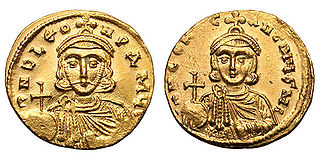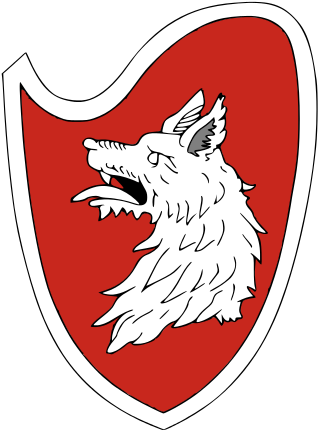
The Suda or Souda is a large 10th-century Byzantine encyclopedia of the ancient Mediterranean world, formerly attributed to an author called Soudas (Σούδας) or Souidas (Σουίδας). It is an encyclopedic lexicon, written in Greek, with 30,000 entries, many drawing from ancient sources that have since been lost, and often derived from medieval Christian compilers.

Karl Krumbacher was a German scholar who was an expert on Byzantine Greek language, literature, history and culture. He was one of the principal founders of Byzantine Studies as an independent academic discipline in modern universities.
Taurinius was a Roman usurper who revolted against Severus Alexander in 232 AD. He was declared emperor by the legions stationed in Roman Mesopotamia when they rebelled, due to the invasion of the Sassanids in 229 AD. His revolt was swiftly crushed by Alexander, in late summer of 232 AD, and he drowned in the Euphrates while attempting to flee to Sassanid territory.

Historische Zeitschrift, is a German scholarly journal of history and historiography. Founded in 1859 it was the first and for a time the foremost historical journal in Europe. It is published by Akademie Verlag GmbH, a subsidiary of Oldenbourg Wissenschaftsverlag GmbH.

Herbert Hunger was an Austrian Byzantinist, palaeographer and university professor. He was an influential specialist in Byzantine literature, particularly of the secular vein.

Walter de Gruyter GmbH, known as De Gruyter, is a German scholarly publishing house specializing in academic literature.

The Battle of Litosoria or Lithosoria occurred between the Byzantines and Bulgars in the fall of 774 at an unknown place named Litosoria. It was located in the border area between both states, in the region of Zagore, probably north of the line Kirklareli - Vize in modern Turkey. The result was a Byzantine victory.
Akademie Verlag (AV) is a German scientific and academic publishing company, founded in 1946 in the Soviet-occupied eastern part of divided Berlin to facilitate the publication of works by and for the German Academy of Sciences Berlin.
The Yantar Special Economic Zone is a Special Economic Zone in Russia that was established in 1996 in the Kaliningrad Oblast of the Russian Federation.
Claus Roxin is a German jurist. He is one of the most influential dogmatists of German penal law and has gained national and international reputation in this field. He has been awarded an honorary doctorate by 28 universities around the world as well as the Bundesverdienstkreuz first class.

Wolfgang Benz is a German historian and anti-semitism researcher from Ellwangen. He was the director of the Center for Research on Antisemitism of the Technische Universität Berlin between 1990 and 2011, and is also a member of the advisory board for the Memorial to the Murdered Jews of Europe and was involved in the memorial's design. He has written or published over 200 works. He is considered to be one of the most renowned and well-known historians in modern Germany, and one of the foremost scholars on anti-semitism studies. He has been referred to as the "doyen" of anti-semitism research.

George Strez Balšić or Gjergj Strez Balsha and his brothers Gojko and Ivan were the lords of Misia, a coastal area from the White Drin towards the Adriatic. The brothers were members of the Balšić noble family, which had earlier held Zeta. They participated in founding of the League of Lezhë, an alliance led by their maternal uncle Skanderbeg. George later betrayed Skanderbeg, by selling a domain to the Ottomans, while his two brothers continued to support Skanderbeg until his death and then continued to fight for the Venetian forces.
Manuel Andreas Knoll is a contemporary German scholar and Professor of Political Theory and Philosophy. After three full professorship awards in Istanbul (2011-2023), in January 2024 he moved back to Munich University (LMU) where he is a Privatdozent.

Byzantine units of measurement were a combination and modification of the ancient Greek and Roman units of measurement used in the Byzantine Empire.
Ralph-Johannes Lilie is a German Byzantinist.
Walther Killy was a German literary scholar who specialised in poetry, especially that of Friedrich Hölderlin and Georg Trakl. He taught at the Free University of Berlin, the Georg-August-Universität Göttingen, as founding rector of the University of Bremen, as visiting scholar at the University of California and Harvard University, and at the University of Bern. He became known as editor of literary encyclopedias, the Killy Literaturlexikon and the Deutsche Biographische Enzyklopädie.
Kocku von Stuckrad is a German scholar of religious studies. He specialises in the European history of religion and the academic study of Western esotericism.
The Akademische Verlagsgesellschaft in Leipzig was an important German academic publisher, which was founded in 1906.
Hans-Georg Beck, FBA, was a German scholar, specializing in Byzantine studies.

Peter Schreiner is a German Byzantinist. From 1979 to 2005 he taught as a full professor of Byzantine Studies at the University of Cologne. Schreiner is one of the leading Byzantinists in German-speaking countries.










